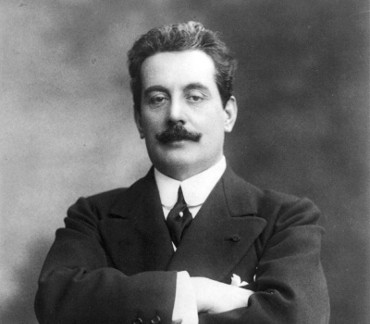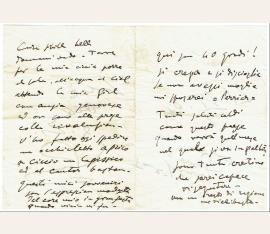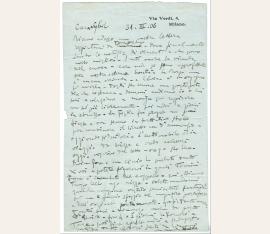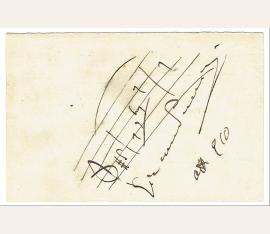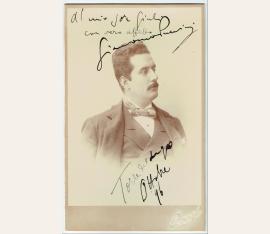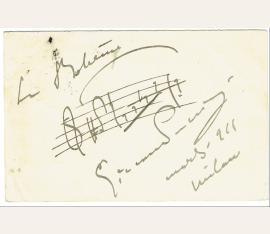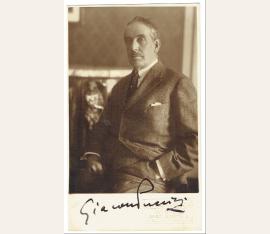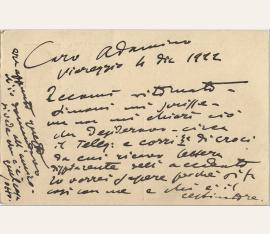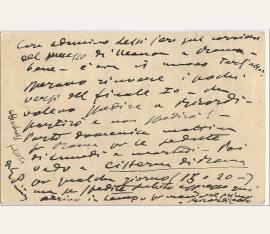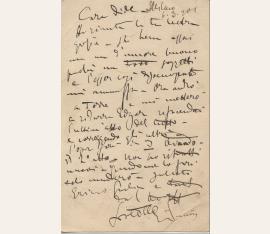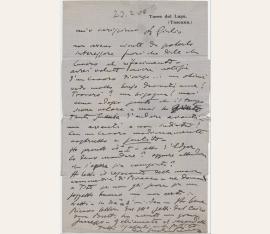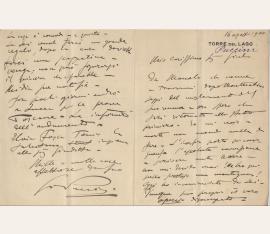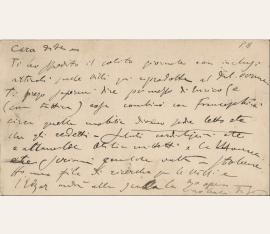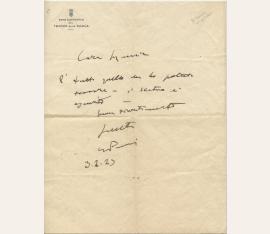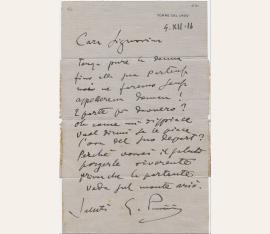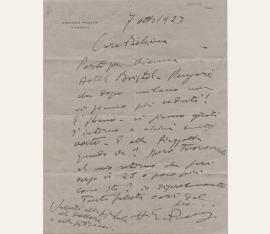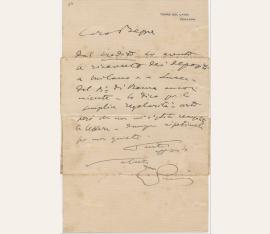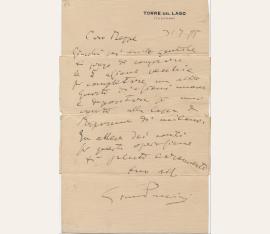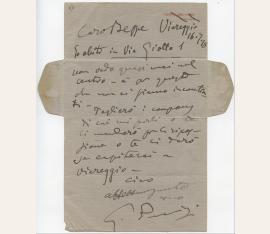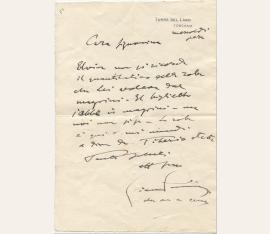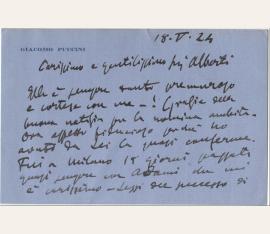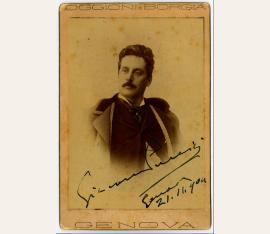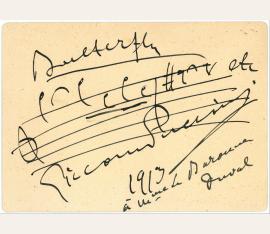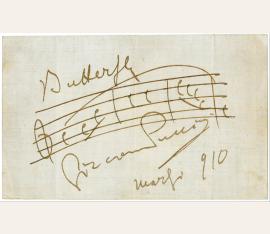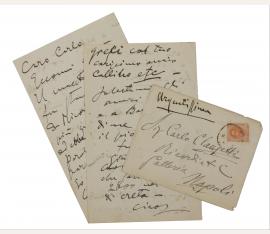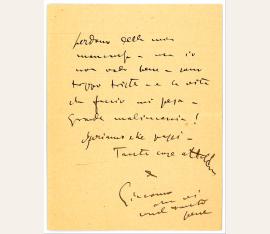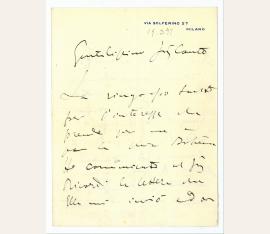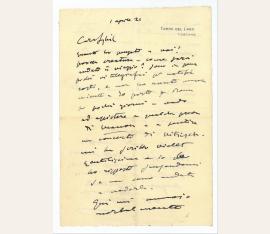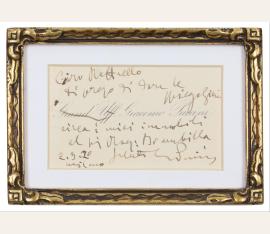italienischer Komponist (1858-1924). Eigenh. Brief mit Unterschrift. o. O. 8vo. 4 pp. Doppelblatt.
3.500 €
(78466)
An seine Geliebte Sybil Seligman: „[…] Cara Sibille bella, domani vado a Torre per la mia ciccia porre al sole, all'acqua, al ciel. Attendo la mia Girl con ansia genovese ed or sono alle prese con la rivoluzion. V'ho fatto oggi spedire un occhieletto aprico, a Ciccio un capisco, ed al cantor baston. Questi miei sovveniri son l'espression modesta del core mio in gran festa quando vicin vi fu. Qui son 40 gradi ! Si crepa e si discioglie. Si non avessi moglie mi sposerei = Perrier = Tanti saluti caldi come questo paese.
Quando verrà quel mese nel quale si va in paltò ? Sono tanto cretino che sarei capace di seguitare – ma un resto di ragione me dice: basta. Tanti saluti a Violet e David. Saluti affetuosi[…]“.
ital. Komponist (1858-1924). Eigenh. Brief mit Unterschrift. Mailand. 4to. 1 p. Gedr. Adresse.
3.500 €
(81636)
To Sybil Seligman who was Puccini’s most constant female friend and at this time she was almost certainly his mistress. Discussing personal matters, and then maked intriguing references to a Franchetti opera and an inevitable meetings with Gabriele d’Annunzio. „I am receiving now one of your letters that was forwarded to me from Torre del Lago; finally I have news of Vincent and the news is much better. I also read about the controversies with the cook. My dear, they just took advantage of your extreme goodness.
[Paoli] Tosti is doing very well but he says that this type of life is tiring him down. Tomorrow we go to lunch to Monza, just the two of us, to breathe a little more freely ,La Figlia’ was really a semi-fiasco. We are now in tight negotiations with D’Annunzio to set up the libretto. I believe he will decide today.“ L Figlia di Lorio (The Daughter of Iorio), sometimes written as La figlia di Jorio, is an opera in three acts by Alberto Franchetti to a libretto by Gabriele D’Annunzio. the libretto is a very close rendering of D’Annunzio’s play of the same name. La figlia di lorio prmiered at La Scala on March 29, 1906, conducted by Leopoldo Mugnone. Although the play, which had premiered two years earlier, was considered one of D’Annunzio’s greatest works, the opera did not achieve a comparable success and has been rarely performed since its day. In this letter Puccini makeds comments about this opera and mentions how he is planning a meeting with D’Annunzio..
ital. Komponist (1858-1924). Eigenhändiges musikalisches Albumblatt mit Unterschrift. Mailand [Poststempel]. Quer-kl.-8vo. 1 p. Postgelaufen.
4.500 €
(86274)
Eigenhändiges musikalisches Albumblatt auf Postkarte geschrieben für Frau Anna Liese Gruneberg in Hamburg. Bei dem nicht näher bezeichneten Notenzitat handelt es sich um einen Takt aus seiner entstandenen Oper „La Bohème“. La Bohème, Puccinis Oper in vier Bildern wurde am 1. Februar 1896 im Turiner Teatro Regio uraufgeführt. Libretto: Giuseppe Giacosa, Luigi Illica.
ital. Komponist (1858-1924). Kabinettphotographie mit eigenh. Widmung und Unterschrift auf der Bildseite. Torre del Lago. 133 : 215 mm.
4.500 €
(87788)
Hübsche Kabinettphotographie im Profil nach rechts, aufgenommen von Giacomo Brogi, Florenz. Mit eigenhändiger Widmung und Signatur. - Tadellos erhalten.
ital. Komponist (1858-1924). Eigenhändiges musikalisches Albumblatt mit Unterschrift. Mailand. Quer-8vo. 1 p. Auf der Rückseite einer Postkarte.
4.500 €
(87914)
Drei Takte aus „La Bohème“ (der Anfang von Mimis Arie „Man nennt mich jetzt Mimi“). Selten.
Komponist (1858-1924). Portraitpostkarte mit eigenh. Unterschrift auf der Bildseite. ohne Ort und Datum. 140 : 90 mm.
2.500 €
(91205)
Hübsches Kniestück aus dem Hause Foka, Wien. - Die Unterschrift in Tinte im hellen Bereich.
Italian composer (1858-1924). Autograph postcard. Viareggio. Oblong-small-8vo. 1 1/2 pp.
800 €
(93832)
Postcard to the Italian librettist, playwright and music critic Giuseppe Adami (1878-1946): „Here I am back - Simoni wrote to me - but he didn't clarify what I wanted - about the telegram and correspondence from Croci, from which I received a regrettable letter about what happened. I would like to know why this is happening to me and who the discarder is. This was precisely what I was asking my friend - it seems that there is something going on. Are you working? Renato [Simoni] wrote to me about the ancient Venetian [La Fiaba di Turandot].
It seems willingly - I am still of the same opinion - and I am waiting. […]“ Adami was best known for his collaboration with Giacomo Puccini on the operas La rondine (1917), Il tabarro (1918) and Turandot (1926)..
Italian composer (1858-1924). Autograph postcard signed. Viareggio. Oblong-small-8vo. 1 p.
1.600 €
(93833)
Postcard to the Italian librettist, playwright and music critic Giuseppe Adami (1878-1946): „Dear Adamino, I read last night in the Corriere della Sera about the success of Manon in Rome - good - is it with the new third act? I was hoping to receive the few lines from the first finale [Turandot] - which I wanted to send to Ricordi - I will leave, and I will not send! - I leave on Sunday morning for Rome for the sessions on Monday and Tuesday. [Puccini was Undersecretary of State for Fine Arts] - Then I go to Cisterna di Roma for a few days (15 or 20) - but if you send it express immediately, I'll arrive in time to send the first act to Ricordi. […]“
Italian composer (1858-1924). Autograph postcard signed. Milan. Oblong-small-8vo. 1 p.
1.500 €
(93834)
Puccini to his sister Tomaide Gherardi: „Dear Dide, I received your letter, thank you - I am quite well, but not in good spirits because I cannot find subjects, and being so unemployed is killing me. Now I will go to Torre [del Lago] and I will start to revise Edgar, completely redoing the final act - and correcting the others - the opera will be in 3 acts, removing the 2nd act. I don't have new portraits - when I get some, I will send them to you - greet Primo, Giulia, and everyone from your affectionate brother G. Puccini.“
Italian composer (1858-1924). Autograph letter signed. Torre del Lago. 4to. 1 p. With address.
2.000 €
(93836)
Puccini writes to his publisher Giulio Ricordi: „My Dearest Mr. Giulio, I had nothing to interest you with except to tell you that I am working on the revision [Edgar] - I would have liked to have news of a different work... but alas, I see a lot of darkness ahead of me! Will I find it? But I must! Never like now have I felt that time is running fast, and never have I had such eagerness to move forward - but forward and not backward! With a work that is modern in construction and sentiment - I have the first act of Edgar ready, should I send it? Or wait until the opera is complete? I have read the review of Bracco's [Roberto] new comedy - I ask Tito if he thinks it is a good subject, but certainly not in 4 acts - In Three - It's an idea - I am well.
I received a letter from Maestro Setti [Giulio] from Cairo where Butterfly had a great success - 9 calls after the second act. […]“.
Italian composer (1858-1924). Autograph letter signed. Torre del Lago. 8vo. 4 pp. Double sheet. Printed letterhead „Torre del Lago“.
3.500 €
(93842)
Letter to his publisher Giulio Ricordi: „From Manolo [Emanuele's ] who came to visit me after Montecatini, I learned about the improvement in his rheumatism - now I hope he has returned to his original state. I am bored to death having nothing to do - Inactivity leads to an absolute aversion even to writing letters - I never decide! I have a mountain of them on my desk! Today, I started with you - So I am truly their unemployed worker - I have never received news from Illica or Giacosa - not even a proposal! What characters! And to think that they have pocketed and continue to pocket some nice money with me: at least financial interest should move them - Not to mention feelings of friendship! ...
What a world! So, I am truly the forgotten one. I would be grateful if you could tell me if a letter was written to New York for that American subject - I always think about it. When I was in Paris, I asked Zola again for L'Abbè Mouret, also to find out if Leoncavallo had really had the exclusivity of that subject, as was also published in the newspapers. But Zola replied as he did the first time to me = Massenet - then if not Massenet, Bruneau. Leoncavallo told another lie - But in the meantime, this subject cannot be obtained either - Return to Maria Antonietta? If it weren't for the too old and exploited revolutionary theme! I don't know where to turn - The best (the last of youth) years pass - It's a shame - We are well here - no mosquitoes thanks to zinc screens on all windows. The house is comfortable - and quiet - If you want to give us a great gift, after the cure, you should come for a visit - come; you can't imagine the pleasure it would give us - Give me your news - In a few days, I will go to Lucca for the Toscani rehearsals (of Tosca) - I will keep you informed of the progress - Elvira, Fosca, Tonio, and Mrs. Giuditta send their greetings - A thousand and a thousand affectionate things from your Giacomo Puccini“.
Italian composer (1858-1924). Autograph postcard signed. Milan. Oblong-small-8vo. 1 p.
1.000 €
(93843)
Puccini to his sister Tomaide, regarding the 4th edition of Le Villi. Puccini, still poor, writes a letter to all his siblings and mom, subtly asking if his brother-in-law Franceschini, husband of his sister Ramelde, has paid for the furniture he had transferred to him. „Dear Dide, I sent you the usual newspaper with articles included about Le Villi reproduced here at Dal Verme. Please let me know through Enrico (your husband) (and tactfully) what was arranged with Franceschini (Ramelde's husband) regarding that furniture - sofa, chairs, bed, etc.
- that I gave him. Warm regards to you and Ramelde, Otilia, Nittetti, and Mom. Write to me sometime - I am well. I have a lineup of research for Le Villi, and Edgar will go to La Scala as the 3rd opera. Goodbye, kisses from Giacomo.".
Italian composer (1858-1924). Autograph letter signed. Milan. 4to. 1 p. With autograph envelope.
1.500 €
(93844)
Puccini to Countess Maria Bianca Ginori, daughter of Count Ginori Lisci, to whom Puccini dedicated La Bohème out of friendship and gratitude. It concerns the sending of tickets for La Scala for the special performance of Manon Lescaut on the XXX Anniversary of the first performance. „Dear Miss, That's all I could find - the theater is sold out. Enjoy the show. Greetings, G. Puccini."
Italian composer (1858-1924). Autograph letter signed. Torre del Lago. 4to. 1 p. Printed letterhead „Torre del Lago“.
1.200 €
(93845)
Puccini's letter to Bianca Maria Ginori: „Dear Miss, please keep the woman until her departure, we will do without her, wait for tomorrow! And is she really leaving? Oh, how sorry I am. Could you tell me if you like the time of your departure? Because I would like to respectfully bid you farewell before the departing one goes up the hill. Greetings, G. Puccini.“
Italian composer (1858-1924). Autograph letter signed. Viareggio. 4to. 1 p. Printed name and address. With holograph envelope.
1.300 €
(93846)
Puccini to Maria Bianca Ginori: „Dear Behina, I am leaving for Vienna, Hotel Bristol [performances of Manon Lescaut] - to think that we haven't seen each other since Milan! It's strange - we've circled around each other so many times - And when will you be at the Piazzetta? I hope to find you upon my return, which will be around the 25th or a little later. How are you? I'm doing well. Many greetings from your G. Puccini.“
Italian composer (1858-1924). Autograph letter signed. Torre del Lago. 4to. 1 p. Folds.
1.000 €
(93847)
Puccini to his friend the Bank Director Giuseppe Chini in Lucca: „Dear Beppe, I have received the receipts for the deposits in Milan and Lucca from the Credito - From the B°= in Rome, still nothing - I mention it for the sake of simplicity - certainly, the letter has not been delivered to me - so please repeat it for my peace of mind - many affectionate greetings from your G. Puccini“.
Italian composer (1858-1924). Autograph letter signed. Torre del Lago. 4to. 1 p. Folds. Printed address.
1.200 €
(93848)
Puccini to Giuseppe Chini, friend and bank director: „Dear Beppe, Since you are so kind, please buy the 5 old shares to complete another quarter of new shares and deposit them on my behalf at the Cassa di Risparmio in Milan. While waiting for the accounts for this operation, I greet you warmly, your affectionate Giacomo Puccini.“
Italian composer (1858-1924). Autograph letter signed. Viareggio. 4to. 1 p. With address. Folds.
1.000 €
(93849)
Puccini to Giuseppe Chini, his friend and bank director: „I live in Via Giotto1. I almost never go to the city center - that's why we haven't met. I will cut the coupons you mentioned and either send them to you for collection or give them to you if you happen to come to Viareggio. Warm regards, yours affectionately, G. Puccini“.
Italian composer (1858-1924). Autograph letter signed. Torre del Lago. 4to. 1 p. With printed address and autograph envelope.
1.400 €
(93850)
Puccini to Bianca Maria Ginori: „Dear Miss, Elvira doesn't remember the quantity of stuff you wanted from Magrini. Magrini received the note, but we don't know. The stuff is here - let me know through Tiberio, etc. etc. Many regards, yours affectionately, Giacomo Puccini, who is going to dinner.“ Very attractive.
Italian composer (1858-1924). Autograph letter card signed. no place. Oblong-8vo. 2 pp.
1.600 €
(93851)
Beautiful letter from the year of his death. „Dearest and very kind Mr. Alberti, you are always so attentive and courteous with me! Thank you for the good news about the honorary appointment. Now I await with confidence because I have almost received confirmation from you. I was in Milan for 15 days, mostly spent with Adami, who is very dear to me. I read about his success in Rome and was pleased about it. I don't pay attention to certain sensational newspapers. Adami's Muse is subtle, refined, gentle, and aristocratic, not for the wet mouths of cocaine.
I would be so happy to collaborate with him again. We are in search of a new subject. Hopefully, we will find one because I am eager to get back to work now that I am about to finish Turandot.“ The notable work mentioned in the letter is "Turandot," an opera that Puccini was in the process of completing. "Turandot" is one of Puccini's renowned operas, known for its grandeur and rich musical language. Unfortunately, Puccini didn't live to see the completion of "Turandot." He passed away later that year, on November 29, 1924. The opera was posthumously completed by Franco Alfano. This letter provides insight into Puccini's mindset, his relationships, and his dedication to his work, offering a poignant perspective given the proximity to his passing and the ongoing creative process..
Italian composer (1858-1924). Cabinet portrait photograph signed. Genoa. 21.11.1904. Sepia toned cabinet photograph (97:138 mm) by Oggioni & Borgia of Genoa with a bold signature in fountain pen at the foot.
3.500 €
(72887/BN46984)
A few light age marks, otherwise a good example of this popular musician.
Komponist (1856-1924). Eigenh. musikalisches Albumblatt mit U. O. O. 165:25 mm.
4.500 €
(73952/BN47888)
Zwei Takte aus "Madame Butterfly" "à Mme le Baronne Duval". - Minimal fleckig.
Komponist (1856-1924). Eigenh. Albumblatt mit Notenzeile und U. O. O. 165:125 mm.
4.500 €
(73953/BN47889)
Drei Takte aus "Madame Butterfly".
Italian composer (1856-1924). Autograph letter signed ("Gi[a]co[mo]"). No place. 8vo. 6 pp. on 3 ff. With autograph envelope.
4.500 €
(80878/BN52757)
In Italian, to Carlo Clausetti at Ricordi's, Naples, on Tosca and La Bohème. Master Pacchierotti, he writes, was bamboozled by Riccordi with the greatest deference, and had many words of encouragement for Ricordi. Puccini's work on Tosca will be ready in the year 2000, and performed at the Royal Theatre of Crete ("Io lavoro a Tosca chi sarà pronta il 2000 ce si darà alr R° teatro di Creta perche tutti i teatri sono di creta" [play on the name of the island Creta, and the word creta, clay]), a building worthy of a water-closet or a domestic theatre, depending on its size.
Carlo is a very nice person, and not made of clay, although all the sons of Adam are descended from the same woman. He is always his tireless thurifer! And Puccini loves it. He writes to him with various little glasses of liquor in front of him; if they were together, he would give him a drink. He instructs him to greet Lombardi and tell him that Vanso will soon be going to Cuba. Carlo has to go to Bari to protect La Boheme, which seems to be in danger: his support will be needed to guide his beloved daughter to the port. Let him beware of baroque attacks ("assalti baresi")! - Small pinholes, otherwise in fine condition..
Italian composer (1856-1924). Autograph letter signed ("Giacomo"). Apparently Paris. 8vo. 2 page and 2 lines on bifolium heading Hotel Westminster, small vignette.
1.800 €
(80879/BN52758)
To his friend Sybil Seligman, in Italian. He was not very well and on the evening of the premiere he was exhausted, and forgot everything, and everyone. The show went very well: great ovation, especially in the second act. He is a little better now, and asks for forgiveness for his forgetfulness. But he is not well, he is too sad and the life he leads weighs on him.
Italian composer (1856-1924). Autograph letter signed ("GPuccini"). Milano. 8vo. 2½ pages on bifolium. In Italian.
3.000 €
(88555/BN58446)
To a count, with appreciation for his interest in "La Bohème", which had premiered on 1 February 1896 at the Teatro Regio in Turin. Puccini has sent Ricordi his letter; they will see what they can do for the actor who is of such interest to the count. - On stationery with embossed address. Small traces of mounting on page 4.
Italian composer (1856-1924). Autograph letter signed ("Giacomo"). Torre del Lago. Small 4to. 2 pp. In Italian.
3.500 €
(88556/BN58447)
To his friend Sybil Seligman, to whom he announces his imminent journey to Rome, where he is to attend performances of Manon Lescaut and to hear a concert by Arthur Nikisch. Elvira is a little sick in Milan; he hopes that the leg of poor Sybil is improving and regrets that the sciatica returns at intervals of at few months' time. - On stationery with embossed address. In fine condition.
Komponist (1858-1924). Eigenh. Visitenkarte mit U. Mailand. 2 SS. Visitkartenformat. Gerahmt (100:145 mm).
2.000 €
(91444/BN60593)
Aus der Sammlung des vielfach ausgezeichneten Historikers und Anglisten Tibor Frank (1948-2022).

Italian composer (1858-1924). Autograph postcard signed. Torre del Lago. Oblong-small-8vo. 1 1/2 pp.
1.400 €
(93835)
Puccini to the Italian librettist, playwright and music critic Giuseppe Adami (1878-1946)about La Rondine and Ricordi: „I desire news from you - I am here in boredom, in complete and absolute calm! If you decide now, it would be the right moment to patch up that little bird - And from Casa Ricordi? I haven't heard anything - I am forgotten by them - And so be it - I care little. Greetings to the Signora and to Nenè“

Italian composer (1858-1924). Autograph letter signed. Cutigliano. 8vo. 2 pp. Double sheet.
1.600 €
(93837)
Puccini to his publisher Giulio Ricordi: „[…] Nothing from Giacosa [Giuseppe, 1847-1906; Italian librettist]! And the ten-day extension has passed - This life cannot go on anymore! Do you know anything about it? We will return to Torre around the 20th or 25th at the latest - Elvira, who seemed to be getting better, now has her constant cough again - Hopefully, it's just due to a cold she caught! I assure you that my life is not beautiful - without work, and with the worry about Elvira, I do not spend joyful days! Enough about work. I hope that at least my spirit will be somewhat lifted. […]“

Italian composer (1858-1924). Autograph letter signed. Torre del Lago. 4to. 1 p. With address.
1.800 €
(93838)
Puccini to his nephew Carlo Marsili, son of his sister Nitteti: „[…] it's been so long! How are you? I haven't seen your mother or sister in a long time - I am always in Lucca, and I have never been there - Languishing time, languishing soul - It was warm for a while - now we live among the holm oaks and calmness - Viareggio was in darkness - now it shines, and are there people at the sea? I haven't seen it yet; I have great contempt for these even expanses that make you think too much - and I think on my own without needing stimuli - Health? No sneezing - but I don't complain - Adami is in Viareggio - not doing much - I am at the completion of La Rondine, and I realize that it's worth little - I will go to Zurich to confer with the Croats, but with the intention of terminating the contract at any cost - I don't want to have anything to do with those beyond the Karst - And how are you doing? The bride is well - are you still just the two of you? Is there anything on the horizon? I greet you warmly, along with Totò - yours, Giacomo.“

Italian composer (1858-1924). Autograph letter signed. no place. Oblong-small-8vo. 3 pp.
2.200 €
(93839)
Puccini to his publisher Giulio Ricordi: „Paladini is here - with whom I have discussed the article - having heard that you will publish photographs of my father and mother, it would be interesting to publish the portrait of Giacomo Puccini, the progenitor of my family born in 1712. Now, since the painted portrait is in my house in Milan in the dining room, you should commission either Blanc or others to go and fetch it and have it photographed (it's also a beautiful portrait) - and of my father, I have a good and very similar miniature (better than the photograph you have) and it is in my room on my bedside table in Milan.
If it is urgent for the newspaper, you just need to send someone with my enclosed note to be delivered to the concierge at Via Verdi, who has the keys to the house - I am quite happy with my work, and around the 8th or 10th, I will come to Milan - Greetings from G. Puccini.“.

Italian composer (1858-1924). Autograph letter signed. Chiasso per Pizzamiglio. 8vo. 4 pp. Double sheet.
3.500 €
(93840)
Letter to his publisher Giulio Ricordi: „Dearest Mr. Giulio, the only person I trust and to whom I can confide everything that goes through my mind is you, who with so many proofs have shown me how much kindness and undeserved trust you have in me. I am tormented by doubt about the libretto by Giacosa: I fear that the subject is not suitable for me, I am afraid... of not being able to set it to music as it should be = ah! if you could find a way to tell Giacosa, without upsetting him, to suspend the work! Upon my return from Germany, I would go to him for 7 or 8 days, and we would understand what to do; we would search, and surely something more poetic, more charming, and less gloomy, with a little more elevation of concept could be found = That Russia scares me, to tell the truth, and doesn't appeal to me much! - I am sure that you will be very sorry for all that I am writing to you, but...
if I were to do a job that I didn't feel completely, I would create a failure with damage to both you and me - With Giacosa, the contract could remain, only the clause of delivery in November could be modified and extended to December or January - I would have enough work to do = I have Manon in August! I am sure that meeting with Giacosa would find what is needed, and we would fully agree to everyone's satisfaction. Certainly, with Giacosa, the second edition Paolo Ferrari-Ponchielli will not happen; he is too kind a person to put the rope around the neck in that way - I entrust myself to you, and write me a line, and if you can, do not mistreat me as I deserve - Please have all the warmest regards and the most distinguished compliments to your wife and family from your affectionate G. Puccini.“.

Italian composer (1858-1924). Autograph letter signed. no place. 8vo. 3 pp.
2.200 €
(93841)
Letter to his publisher Giulio Ricordi regarding his opera Tosca: „[…] My dearest Mr. Giulio, either from Illica or Giacosa, I need these verses in the exact meter of the enclosed note - Be careful to keep the first 4 and the arrangement = Mario = Tosca as I have arranged it - Please take care of it, you achieve more and quickly - Many thanks - I need them soon to be able to send the score - Otherwise, the duet remains incomplete. I am sending you the chords for act 4. The verses are a bit odd, but this way the music is compared - and with the 'tu,' you don't escape; you share the fate, the intention of % is more clearly understood...................
I am quickly having everything sent because after the telegram I received this morning (26), I understand the urgency - Please excuse me if I haven't made these arrangements earlier. Greetings to Tito and everyone. Affectionately, G. Puccini“.
verkauft
E. Brief mit U.
Autograph ist nicht mehr verfügbar
Giacomo Puccini (1858–1924), Komponist. E. Brief mit U. („Giacomo“). Chiatri, 26. Juni 1906 [?]. 1 S. 4°. Mit e. Adresse (Faltbrief). – An Sybil Seligman, „eine wichtige, vielleicht sogar die wichtigste Bekanntschaft seiner späteren Lebensjahre“ (Höslinger, s. u., S. 97), mit der Mitteilung, daß es ihm nun etwas besser gehe und er sich etwas weniger langweile. Es sei so schwierig, heutzutage eine Oper zu schreiben, er hoffe aber, daß ihr das, was er schreiben werde, gefalle, denn sie sei seine beste, aufrichtigste und treueste Freundin: „[...] Come è difficile scrivere un´opera al giorno d´oggi? Spero di fare cosa che possa piacervi – e ci tengo tanto da piacere a voi che siete sempre la mia più cara e adorabile amica fedele e sincera […]”. – Mit Sybil Seligman, der „talentierten Amateursängerin“ und Gattin eines Londoner Bankiers, die der Komponist 1904 in Brescia kennengelernt hatte, verband Puccini ein „leidenschaftliches Liebersverhältnis, das sich jedoch später zu einer reinen und tiefen Seelenfreundschaft abklärte“ (Höslinger, ebd.). – Auf Briefpapier mit gepr. Adresse. – Leicht angestaubt und mit kleineren Gebrauchsspuren. – Literatur: Clemens Höslinger: Puccini. Reinbek bei Hamburg, Rowohlt, 1999 (= rm 50325).
Eigenh. Musikmanuskript
Autograph ist nicht mehr verfügbar
Giacomo Puccini (1858–1924), Komponist. E. Musikmanuskript. O. O. u. D. ½ S. Großes Hochformat. – Vollständige Abschrift Puccinis von 46 Takten der Melodiestimme für erste oder zweite Violine aus (wie von fremder Hand in Bleistift am oberen Rand der Recto-Seite vermerkt) einem „Minuetto di Boccherini“, d. i. dessen Streichquintett in E-Dur. – Mit kleinen e. Korrekturen und alten Tintenwischern; papierbedingt leicht gebräunt und mit kleinem Stecknadeldurchstich sowie kleinen Randeinrissen; die zweite Hälfte des Doppelblattes größtenteils alt abgetrennt.
E. Brief mit U.
Autograph ist nicht mehr verfügbar
Giacomo Puccini (1858–1924), Komponist. E. Brief mit U. („Puccini“). [Torre del Lago], 7. April 1904. 1 S. Schmal-4°. Mit e. Adresse (Faltbrief). – An seinen Verleger Giulio Ricordi (1840–1912) in Mailand über die Suche nach geeigneten Literaturvorlagen für Opernlibretti: „[...] Puccini lavora, lavorerà. Parliamo soventi di libretti possibili. Io leggo or il 1° volume delle novelle di Bandello in cui sono cose veramente graziose. La 4° novella ad esempio narra la gesta della Contessa di Cellant [...] a parer mio di un buon lavoro [...]“. – Die historische Figur der Gräfin von Challant, die 1526 des Mordes an einem ihrer Liebhaber bezichtigt und enthauptet wurde, war erstmals Gegenstand einer Novelle des italienischen Dichters Matteo Bandello (1485–1561) gewesen und wurde Ende des 19. und Anfang des 20. Jhdts. u. a. in einem Theaterstück und in einer Oper behandelt. Puccini entschied sich letztlich wohl gegen den Stoff. – Mit kleinen Randläsuren.
„Turandot”. Eigenhändiges Skizzenblatt.
Autograph ist nicht mehr verfügbar
Aus dem Finale, überschrieben mit „Stacco per duettone“ („Unterbrechung des großen Duetts“). – Etwas fleckig, angestaubt und gebräunt und mit kleinen Randläsuren; in Bleistift.
„Turandot”. Eigenhändiges Skizzenblatt.
Autograph ist nicht mehr verfügbar
Etwas fleckig, angestaubt und gebräunt und mit kleinen Randläsuren; in Bleistift.
21 autograph letters (17), lettercards (1) and postcards (3), mostly signed.
Autograph ist nicht mehr verfügbar
Very comprehensive collection of private letters written to his last love, Rose Ader (1890-1955). "Between 1921 and 1923, Puccini enjoyed what was likely his last romantic fling when he fell passionately in love with a young German soprano, Rose Ader, for whom he created the part of Liù in his final work, 'Turandot'" (New Grove). "My good and sweet Rosa", Puccini writes on 17 April 1921, in one of his earliest letters to Rose, "I am deeply moved as I write you. I would wish to be able to tell you what I have in my heart - if only you could understand! Besides the distance which separates us there is the matter of the language which prevents us from saying all that we have in our hearts - what good fortune that I should have met you and what misfortune not to be able to speak together! I would have such riches in expression with which to express my great love! A love which will be with me all my life - you cannot imagine what an impression you made on me! Your languid eyes which when they looked at me strike my heart as though to seek an echo of an immense affection. I shall never be able to forge you - my Rosa what will happen to me. How can I bear being so far away. Yet it is necessary to suffer and to wait. Life is all one waiting and one suffering! Study, study, I beg you on my knees. Study with ardor and feverishly a little of my language. I believe that guided by the love that you have for me you will soon succeed in understanding me. That day will be one of the most beautiful ones of our life. Write to me even in German. I shall have your letter translated. If with the help of Mrs. S... you wish to write in French I shall not let the eyes of a stranger see your letter. I shall write you every week and even more often than that. How clearly I write! Never have I written in this manner - for you, my joy, I do everything [...]" (transl. from the Italian original).
Eigenh. musikalisches Albumblatt mit U.
Autograph ist nicht mehr verfügbar
Zwei Takte aus seiner Oper „La Fanciulla del West“. – In der zweiten Märzhälfte 1913 hielt sich Puccini in Berlin zur Aufführung von „La Fanciulla del West“ auf.
Albumblatt mit eigenh. Notenzitat, Widmung und U.
Autograph ist nicht mehr verfügbar
Gewidmet ist das hübsche Blatt dem österreichischen Tenor Leo Slezak, der im November des Vorjahres einen Dreijahresvertrag an der Metropolitan Opera angetreten hatte. Puccini seinerseits war im November nach New York gereist, wo am 10. Dezember die Uraufführung seiner Oper "La fanciulla del West" unter dem Dirigat Arturo Toscaninis stattfinden sollte. Die Premiere geriet zum Triumph für den Komponisten wie für den Dirigenten, nicht weniger als 55 Vorhänge gab es am Premierenabend. - Zusammen mit drei Programmzetteln der Wiener Oper a. d. J. 1898, 1910 und 1923 ("Die Bohème", "Manon Lescaut" und "Tosca") in klappbarem Wenderahmen hinter Glas.
Eigenh. Musikzitat mit U.
Autograph ist nicht mehr verfügbar
Hübsches Musikzitat mit einem Takt aus der Oper "La Bohème" (1896). Auf dekorativem Briefpapier des Wiener Grandhotels Bristol, wo sich Puccini anlässlich der Uraufführung der "Madame Butterfly" an der Wiener Staatsoper am 31. Oktober 1907 aufhielt. Zuletzt in der Sammlung Alfred Knizek, Mauerbach bei Wien. - Mit Portrait gerahmt.
Autograph postcard signed.
Autograph ist nicht mehr verfügbar
Postcard to the Italian librettist, playwright and music critic Giuseppe Adami (1878-1946) whom he calls affectionately „Dear Adamino“. „How are you? We are working, but there is little good news. Have you heard anything from Casa Ricordi? And Simoni? [Adami and Simoni were working on Turandot]. I sent them some hunting, telling them to share some with you as well. And Manon? Have you tried it? Viareggio is divine - and for the 3rd Act? Will Simoni finish it soon? […]“ - Puccini was in Rome for the rehearsals of Trittico and Tosca. Adami was best known for his collaboration with Giacomo Puccini on the operas La rondine (1917), Il tabarro (1918) and Turandot (1926).
